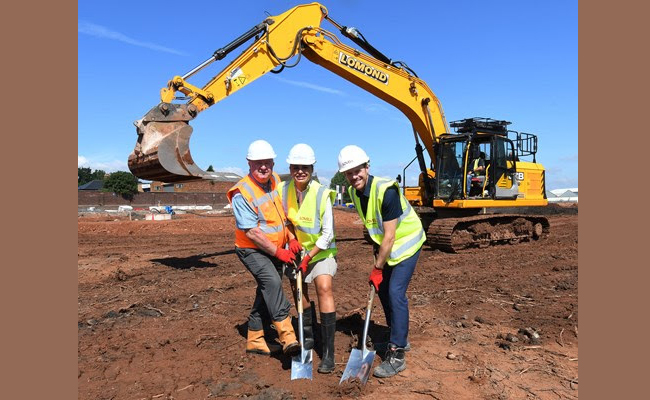Cllr Mike Bird (left), WMCA portfolio holder for housing and land at Cable Street, Wolverhampton – one of the housing developments to benefit from the £41m funding. With him are Stuart Penn, regional managing director for Lovell and Cllr Beverley Momenabadi from City of Wolverhampton Council
A further £41m has been secured by the West Midlands Combined Authority (WMCA) to help unlock hundreds of acres of former industrial land for much-needed new homes.
The money has been given by government to help supercharge the WMCA’s drive to breathe new life into derelict sites by using them for housing.
The funding will help accelerate an already impressive 30% increase in house building across the region with numbers rising from 11,288 in 2014/15 to 14,628 in 2017/18. Figures for 2018/19 are released in the autumn and expected to show a further increase.
The majority of these new homes have been built on derelict industrial sites, often referred to as brownfield land, helping to relieve pressure on the Green Belt.
The first housing development on brownfield land to be delivered through the £41m Land Fund is Cable Street/Steelhouse Lane in Wolverhampton, with further sites to follow across the region including locations in Walsall, Willenhall, Coseley and Solihull.
Andy Street, Mayor of the West Midlands, said: “Our region is leading a house building revolution in the UK, turning derelict land into vibrant, new communities.
“This latest £41m funding from Government will enable us to continue to buy and clean-up derelict sites that would otherwise lie vacant.
“We can then sell the sites on, or develop them in partnership with house builders, making sure the new homes are affordable, well-designed and energy efficient.”
The region needs to build 215,000 new homes by 2031 to meet its future housing and economic needs and the WMCA is working to ensure the vast majority of these are on brownfield.
Many such sites, which are often branded an eyesore by nearby residents, are notoriously difficult to regenerate because of the high clean-up costs for developers.
But by paying for the land’s remediation the WMCA can ‘invest to unlock’ and offer an attractive site for developers while laying down minimum standards of affordability, design and energy efficiency.
Cllr Mike Bird, WMCA portfolio lead for housing and land and leader of Walsall Council, added: “The West Midlands has a vast amount of former industrial land crying out for redevelopment and we see this as an asset.
“By using it for new homes we can relieve pressure on the Green Belt and help protect our environment for future generations while providing them with a decent and affordable home.
“So this latest payment should be seen as a ringing endorsement by government of our ‘brownfield first’ policy.”
The £41m funding is part of a £350m Housing Deal agreed between the WMCA and government last year.
The deal will help make up a wider £760m war chest set aside by the authority to kick-start both commercial and residential developments, predominantly on brownfield land.
The WMCA is targeting funding on developments that meet its key goals, including tackling youth and long-term unemployment, securing affordable housing, maximising public transport connectivity and supporting advanced methods of construction.
